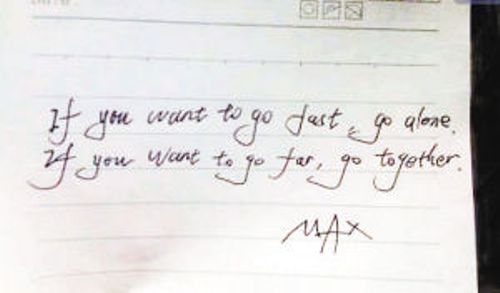 Expats may enjoy each day in China as an “adventure” waiting to happen, but have you considered that Chinese have stories of their own about their “adventures” with foreigners?
Expats may enjoy each day in China as an “adventure” waiting to happen, but have you considered that Chinese have stories of their own about their “adventures” with foreigners?
Guangzhou Daily shares with us a number of personal stories in which Chinese people encounter an expat who, to their often embarrassing surprise, understands Putonghua. While the number of foreigners that have adapted to living in China has increased, it seems the number of Chinese that continue to underestimate them remains extremely high.
We can’t vouch for the authenticity of any of the stories below, especially when a supposed personal anecdote is told in the third person, but all of them sound truthful enough. They are short, life-like, and share the same theme.
They are also accompanied with pictures of movie stars, which we’ll reproduce here:
 One day I was at the supermarket buying something when I saw a black person. I turned to my friend next to me and said, “Hey look, that black laowai is really black.” The black person then looked back at me and said, “[I'm not black, it's just that] you’re so white.”
One day I was at the supermarket buying something when I saw a black person. I turned to my friend next to me and said, “Hey look, that black laowai is really black.” The black person then looked back at me and said, “[I'm not black, it's just that] you’re so white.”
 During university, my classmates and I had all gone out to arrange our class schedule when a brother from Africa who was very black appeared in front of us. One of my classmates said, “So fucking black!” We didn’t think that the laowai would turn his head around and say “So fucking yellow!” We just about fell over at that point~!
During university, my classmates and I had all gone out to arrange our class schedule when a brother from Africa who was very black appeared in front of us. One of my classmates said, “So fucking black!” We didn’t think that the laowai would turn his head around and say “So fucking yellow!” We just about fell over at that point~!
 Two women and a foreign man were taking an elevator together. One of the women noticed the chest hair of the laowai was very long, and said to the other woman, “Look, the laowai’s chest hair is very sexy.” Who would have thought that the laowai would suddenly answer: “Thank you!”.
Two women and a foreign man were taking an elevator together. One of the women noticed the chest hair of the laowai was very long, and said to the other woman, “Look, the laowai’s chest hair is very sexy.” Who would have thought that the laowai would suddenly answer: “Thank you!”.
 Me and my girlfriend went to a roller skating rink. My girlfriend repeatedly fell down so I said, “Piggy, do you see that beautiful foreign girl over there? She is much taller than you, but she skates so much better.” That foreign woman skated over and said, “Thank you for your compliment, handsome.” Faint! I hurriedly used my English to answer back, “Not at all.”
Me and my girlfriend went to a roller skating rink. My girlfriend repeatedly fell down so I said, “Piggy, do you see that beautiful foreign girl over there? She is much taller than you, but she skates so much better.” That foreign woman skated over and said, “Thank you for your compliment, handsome.” Faint! I hurriedly used my English to answer back, “Not at all.”
 Once, my dad went to the Great Wall. As he climbed the wall, he saw a tall, white person sitting on a step. My dad told the people all around him, “Look, this laowai doesn’t have the strength to climb the Wall.” Then the white person replied, “I’m taking a short break, is that okay?”
Once, my dad went to the Great Wall. As he climbed the wall, he saw a tall, white person sitting on a step. My dad told the people all around him, “Look, this laowai doesn’t have the strength to climb the Wall.” Then the white person replied, “I’m taking a short break, is that okay?”
 There was this time I was eating sand pot noodles at a neighborhood outdoor stall. I was dripping with so much sweat that it was like I was drunk or crazy. It so happened the dormitories for Southern University were next door. Then, a young woman of Chinese nationality walked out holding the hand of a black child of about five years old. This small black child kept looking at my drooling face as they kept walking, and then suddenly said in a perfect Nanjing dialect, “I want to eat sand pot noodles!” I just about spit out my noodles.
There was this time I was eating sand pot noodles at a neighborhood outdoor stall. I was dripping with so much sweat that it was like I was drunk or crazy. It so happened the dormitories for Southern University were next door. Then, a young woman of Chinese nationality walked out holding the hand of a black child of about five years old. This small black child kept looking at my drooling face as they kept walking, and then suddenly said in a perfect Nanjing dialect, “I want to eat sand pot noodles!” I just about spit out my noodles.
 I was once taking the Guangzhou Metro when I saw a family of foreigners. The mother was leading the daugher who was very pretty, just like a doll. Then, an old gentlemen beside her used standard English to ask, “Where are you from?” The little girl impatiently replied with a nonchalant answer in Chinese: the USA.
I was once taking the Guangzhou Metro when I saw a family of foreigners. The mother was leading the daugher who was very pretty, just like a doll. Then, an old gentlemen beside her used standard English to ask, “Where are you from?” The little girl impatiently replied with a nonchalant answer in Chinese: the USA.
 I wanted to bring my classmate on a trip to Beijing one weekend but she was too lazy to come along, so I had to go alone. On the train there, I sat next to a very good-looking foreign man. So I called up my classmate to vent at her. I told her, “You’re going to regret this for the rest of your life! I’m telling you, there’s a foreign man sitting next to me with a side profile that looks like Brad Pitt. All the more eye candy for me!” After I put the phone down, I noticed that the man was noticably happy at me; his heart was brimming with joy as his face radiated with happiness. The foreign man then told me (in Chinese), “Miss, your side profile is also very beautiful!” …Opposite us were a couple that almost fell over from laughing. It was all I could do to refrain from jumping off the train.
I wanted to bring my classmate on a trip to Beijing one weekend but she was too lazy to come along, so I had to go alone. On the train there, I sat next to a very good-looking foreign man. So I called up my classmate to vent at her. I told her, “You’re going to regret this for the rest of your life! I’m telling you, there’s a foreign man sitting next to me with a side profile that looks like Brad Pitt. All the more eye candy for me!” After I put the phone down, I noticed that the man was noticably happy at me; his heart was brimming with joy as his face radiated with happiness. The foreign man then told me (in Chinese), “Miss, your side profile is also very beautiful!” …Opposite us were a couple that almost fell over from laughing. It was all I could do to refrain from jumping off the train.
 I’m from Jinan. Once, my father and his colleagues went on a business trip to the USA where they went shopping at a supermarket. As they discussed among themselves in the Jinan dialect, they were approached by an American who used a proper Jinan dialect to say to them, “You are from Jinan!” The colleagues all exploded in sweat. After speaking a while, it turns out that this laowai had stay behind with the rear US guard after the war. The colleagues asked him, “So, how is your English?” The laowai slapped his leg and said, “English is so fucking hard to learn!!”
I’m from Jinan. Once, my father and his colleagues went on a business trip to the USA where they went shopping at a supermarket. As they discussed among themselves in the Jinan dialect, they were approached by an American who used a proper Jinan dialect to say to them, “You are from Jinan!” The colleagues all exploded in sweat. After speaking a while, it turns out that this laowai had stay behind with the rear US guard after the war. The colleagues asked him, “So, how is your English?” The laowai slapped his leg and said, “English is so fucking hard to learn!!”
Related:
Photos: Guangzhou Daily




































Opinion: Laowai is a Four Letter Word
Posted: 06/3/2014 12:00 pmIt’s thrown around by our colleagues, the jianbing seller, taxi driver, your students, and maybe even your friends. Even though it’s such a ubiquitous term, nobody seems to be quite sure what “laowai” really means. Should you feel good to be referred to that way, as a member of a prestigious club? Or should you be taken aback at being singled out as something different?
Some may say that “laowai” is a neutral term that doesn’t contain any inherent meaning other than “foreigner”. If there are any negative connotations in the word, they stem from the context in which the word is used. But this ignores the latent meaning of the word, shrouding it behind the banality of daily repetition that grinds its significance into unfeeling, bureaucratic indifference.
Taken literally, “laowai” written in Chinese is 老外 (lǎowài). Individually, its components are 老 (lǎo) meaning “old”, and 外 (wài), meaining “outside”. “Laowai” most definitely does not mean “foreigner” in Chinese; instead, that term is written as “外国人” (wàiguórén) which is made up of “外国” for “foreign” and “人” for “person”.
There is no English equivalent of “laowai” in English; this mostly stems from the fact that most English-speaking cultures don’t inherently view the world as being divided between themselves and everyone else (most, I said).
There may be some confusion to what “laowai” actually means due to its individual components. “Old” is universally regarded in Chinese culture as a sign of respect. If someone is called “Old Wang”, then the Wangster is a person of a dignified position, regardless of his age. With this same thinking, a “laowai” should be a position that is equally respected—something absolutely true if it wasn’t for the second half of the term, “outside”.
Family is the most important component of Chinese society. As a way to endear themselves to others, many Chinese will address strangers with family roles; for example, to call a fellow man a “哥们儿” (gēmenr) is to afford him the respect of not just a fellow brother, but an elder one. After family, the respect commanded by any one person starts to thin out the further away they are located from the family home: friends, business associates, co-workers, neighbors… until it becomes a question of geography.
Being an outsider is pretty much the lowest scale to occupy on the Chinese social hierarchy. You are not trusted; your customs and habits are strange and unfamiliar; you are the unknown that stands in contrast to the family circle; your existence is a contradiction to all that which is Chinese.
So when when taken together, “laowai” means “respectable outsider” and not the “Hey, old whitey!” that Lonely Planet tried to convince me of at a more naive stage of my stay here. One could take it as as a backhanded compliment if one enjoys masochism in their majesty, but the word “laowai” is basically a system of control to always alienate a foreigner. No matter how well you speak Chinese, no matter how much you pander, no matter how much you love China – you don’t belong.
Respectfully speaking, of course.
***
Editor’s note: If you’re still not convinced, we’ve found a very simple process to both confirm the opinions expressed here as well as to give yourself the social advantage anywhere in China. Please use responsibly.
Photo: iQiLu